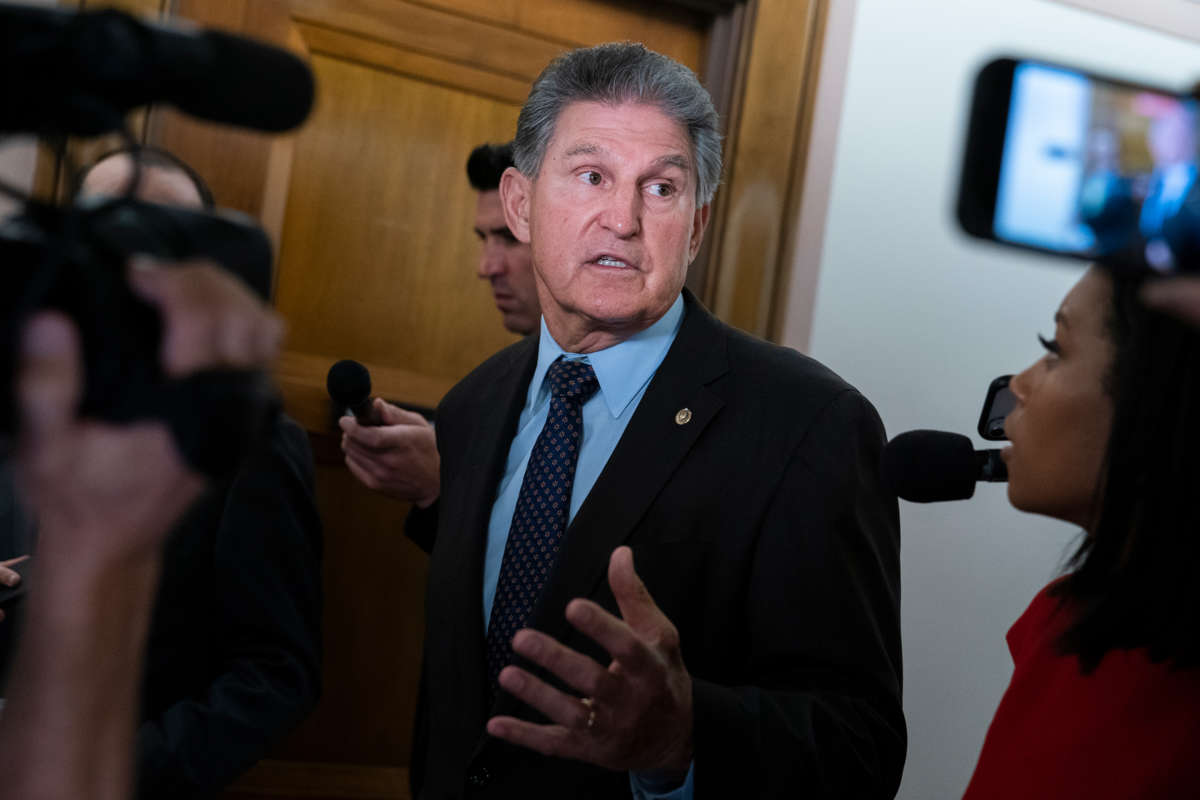As noted yesterday, West Virginia’s rock-in-the-road Sen. Joe Manchin is all but untouchable at the moment. Secure in his office until 2024, and with the threat of defection to the GOP ever present, he remains able to snarl vital legislation and filibuster reform/abolition without the building falling down on him.
Manchin’s next week or two won’t be the building falling, but he is about to hear from activists and religious leaders who have spent their lives at the ramparts fighting the long struggle for civil rights in the U.S. In a similar vein, the cork has popped on the progressive side of the House of Representatives, with patience for Manchin’s self-serving intransigence nearing a very loud end.
This morning, Manchin took a meeting with the heads of the National Urban League, the National Council of Negro Women, the NAACP, the Lawyers’ Committee for Civil Rights Under Law, and the Leadership Conference on Civil and Human Rights. The institutional memory of systemic racism within these groups is beyond profound, and the outcome of their conversation with Manchin regarding the civil rights laws he is blocking was waited for with great interest.
“The goal of the meeting for us in the civil rights leadership is to establish and build the relationship,” Derrick Johnson, president and CEO of the NAACP, said on Monday night. “There was no particular item on the agenda, but we will have a conversation about our policy priorities and hopes to open up the dialogue so that we can, in fact, have the type of give-and-take opportunity to ensure that all Americans are supported.”
It appears Manchin emerged from this morning’s meeting unmoved by the arguments put before him. “Meeting between civil rights activists and Manchin over S1 didn’t change his mind,” reports CNN’s Manu Raju. “‘I don’t think anybody changed positions on that,’ Manchin said, calling the conversation ‘constructive.’”
Progressive activists have long employed an “inside/out” strategy to exert political pressure: Meet with politicians inside their office, and let them hear the protesters on the streets outside that room. To that end, a few days after Manchin meets with those civil rights leaders, he will be the focus of a protest by the Rev. William Barber, co-chair of the Poor People’s Campaign.
“Even if [Manchin] doesn’t change,” Barber told The Washington Post, “we have to bear witness to how his policies are hurting the democracy, are a form of political and legislative violence, and that he is standing more on the side of the corporate lobbyists rather than poor and low-wealth workers and people across this country.”
This will not be Manchin’s first encounter with Barber and the Poor People’s Campaign. After voicing his resistance to the $15 minimum wage back in February, Manchin met with Barber, who came away from the meeting deeply disappointed. “We’re not interested in compromise,” he told reporters at the time. “$15 is a compromise. What [Manchin] was suggesting would just further keep people in poverty.”
On Monday, Barber called Manchin’s stances on the voting bills and the filibuster “wrong, constitutionally inconsistent, historically inaccurate, morally indefensible, economically insane, and politically unacceptable.” It is an open question as to whether Barber’s planned June 15 march on Manchin will have any more effect than his February meeting did, but Barber is hardly alone in voicing his deep anger at the West Virginia Democrat. It’s getting awfully loud under the Capitol dome, and promises to get louder still.
“Manchin’s op-ed might as well be titled, ‘Why I’ll vote to preserve Jim Crow,’” tweeted Rep. Mondaire Jones on Sunday, in reference to Manchin’s weekend op-ed.
Rep. Alexandria Ocasio-Cortez accused Manchin of supporting “voter suppression,” and progressive colleague Rep. Jamaal Bowman concurred. “Republicans have been ramming through voter suppression bills around the country along party lines,” Bowman said via Twitter. “Democrats can’t afford to condition protecting the right to vote on their cooperation.”
It’s also getting loud back in West Virginia. The United Mine Workers of America (UMWA), a muscular organization that is a power in that state, came out in favor of the voting legislation Manchin opposes. “It is wrong for these states to attack the basic rights of citizens to participate in our democracy,” said UMWA International President Cecil Roberts. “Congress should be doing everything possible to not just maintain, but expand voting access and create freer and fairer elections. If only one party is interested in doing that, then so be it.”
Senate Majority Leader Chuck Schumer has announced his intention to bring this legislation up for a vote during the week of June 24, no matter where Manchin may be on the matter. That’s two weeks from today, two weeks to see if a man who says “no” like a record on repeat can be made to see the light. It would probably be helpful if the president of the United States did some more lobbying of his own, too. I’m just sayin’.
Our most important fundraising appeal of the year
December is the most critical time of year for Truthout, because our nonprofit news is funded almost entirely by individual donations from readers like you. So before you navigate away, we ask that you take just a second to support Truthout with a tax-deductible donation.
This year is a little different. We are up against a far-reaching, wide-scale attack on press freedom coming from the Trump administration. 2025 was a year of frightening censorship, news industry corporate consolidation, and worsening financial conditions for progressive nonprofits across the board.
We can only resist Trump’s agenda by cultivating a strong base of support. The right-wing mediasphere is funded comfortably by billionaire owners and venture capitalist philanthropists. At Truthout, we have you.
We’ve set an ambitious target for our year-end campaign — a goal of $250,000 to keep up our fight against authoritarianism in 2026. Please take a meaningful action in this fight: make a one-time or monthly donation to Truthout before December 31. If you have the means, please dig deep.
